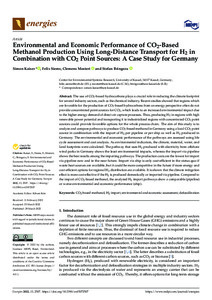| dc.date.accessioned | 2022-06-03T10:27:48Z | |
| dc.date.available | 2022-06-03T10:27:48Z | |
| dc.date.issued | 2022-03-29 | |
| dc.identifier | doi:10.17170/kobra-202205176195 | |
| dc.identifier.uri | http://hdl.handle.net/123456789/13891 | |
| dc.description.sponsorship | Gefördert durch den Publikationsfonds der Universität Kassel | ger |
| dc.language.iso | eng | eng |
| dc.rights | Namensnennung 4.0 International | * |
| dc.rights.uri | http://creativecommons.org/licenses/by/4.0/ | * |
| dc.subject | CO₂-based methanol | eng |
| dc.subject | H₂ import | eng |
| dc.subject | environmental and economic assessment | eng |
| dc.subject | defossilization | eng |
| dc.subject.ddc | 500 | |
| dc.subject.ddc | 600 | |
| dc.title | Environmental and Economic Performance of CO₂-Based Methanol Production Using Long-Distance Transport for H₂ in Combination with CO₂ Point Sources: A Case Study for Germany | eng |
| dc.type | Aufsatz | |
| dcterms.abstract | The use of CO₂-based hydrocarbons plays a crucial role in reducing the climate footprint for several industry sectors, such as the chemical industry. Recent studies showed that regions which are favorable for the production of CO₂-based hydrocarbons from an energy perspective often do not provide concentrated point sources for CO₂, which leads to an increased environmental impact due to the higher energy demand of direct air capture processes. Thus, producing H2 in regions with high renewable power potential and transporting it to industrialized regions with concentrated CO₂ point sources could provide favorable options for the whole process chain. The aim of this study is to analyze and compare pathways to produce CO₂-based methanol in Germany using a local CO₂ point source in combination with the import of H₂ per pipeline or per ship as well as H₂ produced in Germany. The environmental and economic performance of the pathways are assessed using life cycle assessment and cost analysis. As environmental indicators, the climate, material, water, and land footprints were calculated. The pathway that uses H₂ produced with electricity from offshore wind parks in Germany shows the least environmental impacts, whereas the import via pipeline shows the best results among the importing pathways. The production costs are the lowest for import via pipeline now and in the near future. Import via ship is only cost-efficient in the status quo if waste heat sources are available, but it could be more competitive in the future if more energy and cost-efficient options for regional H₂ distribution are available. It is shown that the climate mitigation effect is more cost-effective if the H₂ is produced domestically or imported via pipeline. Compared to the import of CO₂-based methanol, the analyzed H₂ import pathways show a comparable (pipeline) or worse environmental and economic performance (ship). | eng |
| dcterms.accessRights | open access | |
| dcterms.creator | Kaiser, Simon | |
| dcterms.creator | Siems, Felix | |
| dcterms.creator | Mostert, Clemens | |
| dcterms.creator | Bringezu, Stefan | |
| dc.relation.doi | doi:10.3390/en15072507 | |
| dc.subject.swd | Deutschland | ger |
| dc.subject.swd | Kohlendioxid | ger |
| dc.subject.swd | Methanol | ger |
| dc.subject.swd | Wasserstoff | ger |
| dc.subject.swd | Import | ger |
| dc.subject.swd | Umweltbilanz | ger |
| dc.type.version | publishedVersion | |
| dcterms.source.identifier | eissn:1996-1073 | |
| dcterms.source.issue | Issue 7 | |
| dcterms.source.journal | Energies | eng |
| dcterms.source.volume | Volume 15 | |
| kup.iskup | false | |
| dcterms.source.articlenumber | 2507 | |


